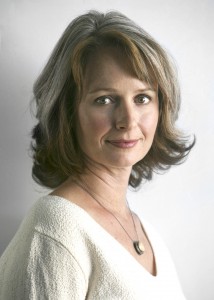Kristine Bentz is a Life Cycle Celebrant and Home Funeral Guide, certified by the Celebrant Foundation and Institute. She holds an M.S. in Public Service Management, with an emphasis in servant leadership.
 Kelly: First of all, could you tell us a little bit about what you do?
Kelly: First of all, could you tell us a little bit about what you do?
Kristine: I listen to people’s stories. I reflect back to them these stories’ beauty, and discuss with them who they are, what they believe, and how we will express this through relevant ritual and ceremony. I companion people in joy and in sorrow. I support people at all parts of the life spectrum as a ceremonial guide. I’m a Life-Cycle Celebrant® and home funeral guide, assisting people at life’s thresholds, like birth, love, marriage, and the final crossing of death.
Kelly: How did you get into this business? What inspired you?
Kristine: My truest calling is being calm and steady with people at times of transition. I am especially drawn to the “thin places,” between worlds. When we’re in transition, be it birthing or becoming married or caregiving for death or being the person dying, we enter sacred time and space. The truth of that moment is highly present for people. What is false just falls away. I realized mid-life I want to be there, serving people during those times, which are simultaneously vulnerable and pure.
A woman named Ruth inspired me. I was living in cohousing and she lived two doors away. She was like a sister to me, even though a few decades separated us. She was dying and was very conscious of her transition. She invited me into that process. She knew about my love for ceremony and she also did a lot of ceremonial work. She wanted to hand her knowledge over as a gift to me, in a sense, before she died. She shared her verbal stories as well as her written library. She held very specific ideals for her death care, asking me to help care for her body after her death, and she requested a natural burial. Together with a small group of women and a talented backhoe operator, we made her wishes a reality. We cared for her body ourselves, entirely naturally. We washed her, bathed her, blessed her, sang to her, wrapped her in her shroud and we also held a natural burial for her in the desert. It was a life-changing experience, being able to walk in that continuum with her. I really think of it as a continuum: dying, into death and after death. This whole encounter was like no other in my life. I wondered, “Why do we do death any other way? Why do we distance it so much?” Caring for our own is the most real, authentic, healing, natural process. It motivated me to study with Jerrigrace Lyons at Final Passages and become a home funeral guide.
Kelly: Would you say that designing a memorial service helps in the healing process for those people who are dealing with a loss?
Kristine: Yeah, big time. Because whether it’s a memorial service or a celebration of life, or a full-on home funeral, that’s the place where the healing work of grief may begin. We don’t heal entirely in the course of one ceremony of course, yet the opening up to grief and accepting community support offers a place to begin. I look at the rituals and ceremonies I co-create and lead as support for the living, especially when it involves a community gathering. We’re helping the principal mourners carry what’s too heavy to carry on their own. We stand beside them to acknowledge the separation and then help them see, feel, hear and experience how it is possible for life to go forward.
Kelly: What are some of the most creative memorial ideas you’ve encountered?
Kristine: I witness groups or families having seed ideas, yet they feel overwhelmed trying to put it all together – especially if the death was very recent. They have elements like storytelling that they want or feel familiar with, and I help weave these pieces into a coherent experience. They feel relief in being able to hand the job over to me, so they can be fully present at the ceremony and receive it. When they come to me with ideas, that’s fantastic! I welcome creativity. We work together to co-create something real and meaningful. As far as the most creative ideas, that is tough. I had a brother of a deceased who requested we do a “bawdy ballads” element during a celebration of life for his sister. She had lived a long life and loved those tunes, so the idea felt appropriate. He wanted to lead everybody in singing these songs. The audience was laughing big time and had tears of joy in their eyes. He expressed a true connection with his sister. Many of the songs were new to me! I encourage this kind of creative expression, whatever brings the essence of the person into the room, whatever we can do to be close to them after death. Depending on many variables – when sensitively done with respect – a remembrance can be pretty raucous fun. I pay attention and am aware of the different sensibilities needed for a ceremony, depending on the timing and nature of a death.
 Kelly: You offer Green Burial as one of your services; are more people approaching you moving toward that trend?
Kelly: You offer Green Burial as one of your services; are more people approaching you moving toward that trend?
Kristine: Yeah, it’s a return to what we already know. It’s returning and reclaiming what’s in our bones. What we’ve done for centuries, what the rest of the world still does in many places. It is very natural to me. People who live with eco-friendly values today want to carry those into their final wishes. I’m so heartened by people inquiring about their options and then enacting choices outside the contemporary norms. It’s why I speak to groups about alternatives beyond direct cremation or burial. Our national awareness is definitely building in this country, due to efforts from people like Joe Sehee at the Green Burial Council, and Mark Harris, who wrote the book Grave Matters. More and more I see people understanding how natural burial makes sense financially, ecologically, and emotionally. For a few faith groups, it is simply how burial is done.
Kelly: You also offer Transition Services for events like loss of pregnancy or facing a terminal illness; what are these ceremonies like? How are they different from traditional memorial services?
Kristine: Yes, I get a few requests for those services. This encompasses an area where no formal pre-existing rites are staked out. It’s not as easy to identify as, say, a memorial service. Yet for people who know themselves and realize they gravitate toward the healing nature of rituals, they seek this assistance at tough transitions. It’s extremely personal; it’s usually a series of very personal expressions having to do with release. It’s not as community-oriented as traditional memorial services. These services I offer explore more of the internal kind of territory. I work to bring the elements into ritual with people in these instances, like earth, air, water, and fire. By incorporating the natural elements we can process release symbolically as well as tangibly. I’ll use things like water-soluble paper, where people will write messages and watch it dissolve, or burning objects symbolic of pain or anger. Even making earthen graves for people to bury symbolic objects is an option. Usually a modestly plain, yet mindful set of ritual actions can hold very cathartic meaning for people.
And I work with people and their animal companions too, when they’re either leading up to the loss of an animal or after. Rituals as a form of goodbye and gratitude can be helpful during that time.
Kelly: It’s a broad question, but what advice do you have for SevenPonds readers who may be dealing with a loss?
Kristine: Please be gentle with yourself. I often say this to clients and their relations. In our fast-paced world, we’re checking email and looking online, we’re riddled with distractions and noise. We can easily be distracted and not tune into what our own needs are. Being gentle with yourself means slowing down enough to hear what you need. At times of loss, our fragility needs to be met with gentleness. As a Threshold Choir member, I also believe singing can be powerful medicine, even if you’re not a good singer! Music so often unlocks the tears, more than anything else.
Kelly: Thank you so much, Kristine!
Make sure to check out Kristine’s website for Sweetgrass Ceremonies, as well as her memorials blog.

 How do ceremonies aid in the grieving process? An Interview with Kristine Bentz of Sweetgrass Ceremonies
How do ceremonies aid in the grieving process? An Interview with Kristine Bentz of Sweetgrass Ceremonies


 “In Case You Don’t Live Forever” by Ben Platt
“In Case You Don’t Live Forever” by Ben Platt
 Our Monthly Tip: Make an “In Case of Death” File to Ease Loved One’s Grief
Our Monthly Tip: Make an “In Case of Death” File to Ease Loved One’s Grief
 Passing of Beloved Comedian Births a New Comedy Festival
Passing of Beloved Comedian Births a New Comedy Festival















Her expression of “thin places” is such a special way to look at life’s major transitions. It rang perfectly with me.
Report this comment